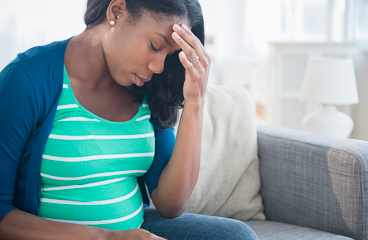
Overview
Nausea and vomiting (often called morning sickness) are common in pregnancy. They are likely caused by pregnancy hormones and happen most often in the first several months. Some people get very sick and are not able to keep down food and fluids. This extreme morning sickness is called hyperemesis gravidarum. It can lead to a dangerous loss of fluids in the body. It also can keep you from gaining weight and getting proper nutrition during your pregnancy.
There are some things you can do to take care of yourself and that may help your symptoms. Medicine may help if you have severe nausea and vomiting.
Follow-up care is a key part of your treatment and safety. Be sure to make and go to all appointments, and call your doctor if you are having problems. It's also a good idea to know your test results and keep a list of the medicines you take.
How can you care for yourself at home?
- Take your medicines exactly as prescribed. Call your doctor if you think you are having a problem with your medicine.
- Drink plenty of fluids to prevent dehydration. Choose water and other clear liquids until you feel better. Try using an electrolyte replacement drink (such as Pedialyte or Rehydralyte) to replace fluids and minerals.
- For nausea when you wake up, eat a small snack such as crackers before rising. Wait a few minutes, then slowly get up.
- Keep food in your stomach, but not too much at once. An empty stomach can make nausea worse. Eat several small meals every day instead of three large meals.
- Ask your doctor about over-the-counter products such as vitamin B6 or doxylamine to relieve your symptoms. Your doctor can tell you the doses that are safe for you.
- Try to avoid smells and foods that make you feel sick to your stomach. High-fat or greasy foods, milk, and coffee may make nausea worse. Some foods that may be easier to tolerate include cold, spicy, sour, and salty foods.
- Get lots of rest. Stress and fatigue can make your morning sickness worse.
- You may want to try P6 acupressure bands. They put pressure on an acupressure point in the wrist. Some people feel better using the bands.
- Try foods and drinks made with ginger, such as ginger tea, ginger ale, and crystallized ginger. Ginger may help with nausea.
When should you call for help?
Call 911 anytime you think you may need emergency care. For example, call if:
- You passed out (lost consciousness).
Call your doctor now or seek immediate medical care if:
- You are too sick to your stomach to drink fluids.
- You have symptoms of dehydration, such as:
- Dry eyes and a dry mouth.
- Passing only a little urine.
- Feeling thirstier than usual.
- You are not able to keep down your medicine.
- You have new symptoms such as diarrhea, fever, or belly pain.
Watch closely for changes in your health, and be sure to contact your doctor if:
- You lose weight.
- Your symptoms get worse or you do not get better as expected.
Current as of: April 30, 2024
Author: Ignite Healthwise, LLC Staff
Clinical Review Board
All Healthwise education is reviewed by a team that includes physicians, nurses, advanced practitioners, registered dieticians, and other healthcare professionals.

